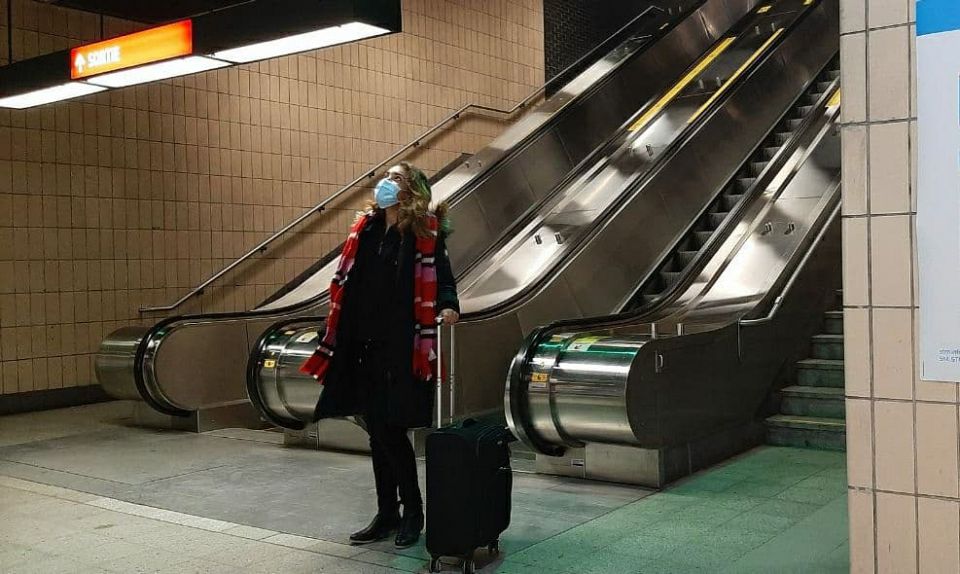LA RELÈVE: The new normal wanderlust, Keep yourself plugged-in and travel...
A couple of years ago some trends appeared as part of innovations for the tourism industry. Most of these trends happened thanks to technology and the interest on improving consumers’ experiences. Among these new creative ideas, one that has had a great impact is the introduction of websites adapted to mobile devices and hotels opening the field to the digitalization of their services, for example allowing the guest to use their phone to open their room and control each feature of the room or the flexibility of online booking and check-in.
 Picture by Nicaury E. Batista
Picture by Nicaury E. Batista
Additionally, hospitality companies started including immersive visual experiences in their sales pitches when presenting their destinations. This allows them to give customers the chance to experience, through virtual reality, the best of a destination without actually being there. Also, the majority of these virtual reality tours can be viewed through any mainstream web browser. Another novelty is the augmented reality or 360-degree video implemented by museums whose objectives are to project history with videos, so people could experience it through live old images.
Those trends had a huge positive impact on each tourism sector; they became tools for marketing and sales. However, in 2020, the situation has changed, and with the arrival of the Covid-19 pandemic the tourism industry has experienced many losses. Borders are closed, people's health has been compromised, and people are afraid to travel outside their countries because of safety and political measures around the world. This has made international travel less frequent. Nevertheless, despite the Covid-19 pandemic, travelers appear motivated to explore their own countries and support the local economy.
TRAVEL HUNTERS LOOKING FOR ACTION
A massive wave of people wanting to travel has emerged because of the new modus operandi that is happening globally. Working from home has been implemented in most companies and people’s lack of contact and socialization makes them more willing to go out and explore, so they do not have to be in front of a screen for the whole week.
 Picture by Nicaury E. Batista
Picture by Nicaury E. Batista
Moreover, emerging technology trends have not stopped. Right now, businesses have had to adapt to the new safety measures the circumstances demand. Some big companies, like Google, for example, are aware of the magnitude of these critical times and how this is changing the economy. They have updated their Google Maps application to allow people to check out a particular destination’s safety requirements before making the trip there. Another feature of this app is that it shows in live time how crowded a place is and how the traffic is, so people can avoid exposing themselves to the possibility of getting the virus. This new technology is perfect to encourage people to go out and support the hospitality businesses that have been losing profits this year.
In addition, another company that is trying to keep people motivated and aware of the updates on the situation for travelers is TripAdvisor, whose platform includes a database of users’ comments and references. This allows consumers to have a better idea of traveling restrictions around the world at any given moment. Also, in the United States and China some artificial intelligence tech startups like Beskoke, RubiQ, Face++, and others have also created tools so people can still go out and travel while respecting the safety rules that have been implemented during the outbreak.
A SEARCH FOR CONNECTION AND SAFETY THROUGH TECHNOLOGY
Travelers are prioritizing safety and are more confident to travel with institutions that are applying reliable safety measures. As a result, consumers’ spending power has been shaken, and so their motivations. Therefore, hospitality companies' reactions to the actual crisis is to pursue new solutions through technology, which have triggered other new trends. Some of these trends include contactless payment, voice search and voice control of guest rooms, virtual hotel and museum tours, online concerts and events, robots, chatbot representatives, and recognition technology for identity confirmation.
 Picture by Nicaury E. Batista
Picture by Nicaury E. Batista
Certainly, we have been seeing how technology is playing an extremely important role in the tourism industry’s plans for facing the pandemic. For instance, technology is essential for the industry to recover post-pandemic. In contrast with other generations, Millennials are more likely to travel solo and take the adventure of exploring their country or travel to those other countries where it is possible to travel right now. These new trends and technologies are the motor for people feeling safe and confident to trust going outside without any risk of jeopardizing their health while enjoying their experience.
In my point of view, the hospitality businesses not only needs to make sure their safety measures are attractive enough so people start traveling, they also need to focus on resetting their business model to be more sustainable and inclusive. Furthermore, they must be more flexible and communicative with the customers. These companies should be more mindful about innovating, maintaining their clients' updates on the current situation for each destination, and creating new personalized experiences for them, so the new circumstances are not as noticeable. By doing this, companies will be able to strengthen customer trust and the quality of services among other sectors. They will be able to create that connection that many are looking for during these hard times.
BRINGING IT ALL TOGETHER
The Covid-19 pandemic has destroyed much of the progress that the tourism industry has been making during the past years with the appearance of new trends and technologies. However, the hospitality field is surviving and creating innovative ideas to adapt to this crisis and challenging situation. Thanks to these new creative solutions through technology, some new trends have appeared and they provide hope to the tourism industry.
Therefore, it is important that companies in the industry not only focus their strategies on applying safety measures but also reinventing their business and taking an agile approach towards their clients’ needs. Our industry has always been a resilient field which is used to change, and this era is no different. We are going to recover and rise like the phoenix with customized new experiences for our customers.
By Nicaury E. Batista
LaSalle College, International School of Hotel Management and Tourism
SOURCES:
Fingent - “Emerging Technology Trends In Travel & Tourism Industry”. May 09, 2019
Wam - “The New Technology and Travel Revolution”. December 05, 2019
Plug and Play - “What Will Happen to The Travel Industry After Coronavirus (And 6 Startups That Can Help) by Ana Camarena”. March 26, 2020
Euromonitor International - “Travel Leaders – An Interview with Fabrizio Orlando, Senior Manager Industry Relations – Global at TripAdvisor”. August 04, 2020
Google - “Get around safely with these new Google Maps features”. Jun 08, 2020
Google - “Guidance for Businesses affected by COVID-19”. August 25, 2020
McKinsey & Company - “Make it better, not just safer: The opportunity to reinvent travel”. June 15, 2020

Les plus commentés